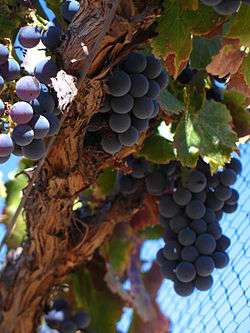Tintara
Tintara is an Australian winery located in McLaren Vale, South Australia within the McLaren Vale wine region. The winery was established in 1861 and incorporated in the 1862 as the Tintara Vineyard Company by Alexander Kelly, a medical physician and winemaker who wrote the early Australian winemaking and viticultural text Winegrowing in Australia and The Vine in Australia. Several prominent figures in the early history of South Australia and McLaren Vale were initial investors in the winery including the founder of the University of Adelaide, Walter Watson Hughes, landowner Samuel Davenport and politician Thomas Elder.[1] Today the winery holds the distinction of producing the oldest surviving bottle of Australian wine—an 1867 Tintara Vineyard claret. The Tintara wine earned the distinction when the previous record holder, an 1864 bottle of Pewsey Vale Cabernet Sauvignon, was accidentally broken by an office cleaner at Christie's auction house.[2][3] [4]
History
Alexander Kelly was a medical doctor with over 17 years of experience in viticulture and winemaking in Australia. Being intrigued at the potential for grape growing in the McLaren Vale, he planted his first vineyard in the area and named it "Trinity". In 1861 he established a winery and in 1862 secured investing to incorporate the winery as the Tintara Vineyard Company. At the time it was one of the first commercial wineries in the McLaren Vale. Among his investors were several prominent figures in 19th century South Australia such as Thomas Elder, Samuel Davenport and Walter Hughes. The initial planting included 210 acres (85 hectares) and was followed with a second wave of plantings in 1864. Among the grape varieties planted were Mataro (Mourvèdre), Shiraz, Grenache and Carignan. By the 1870s, the winery was in financial troubles and was sold to Thomas Hardy & Sons (later Hardy Wine Company, now part of the Accolade Wines portfolio) in 1876.[1]
Oldest surviving bottle of Australian wine
Tintara Winery currently holds the distinction of being the producer of the oldest surviving bottle of Australia wine. The bottle, a Bordeaux style blend labeled as a claret, dates back to the 1867 vintage. Its existence was previously unknown until it resurfaced in the 1970s. In 1977, the wine was sold to a private collector by Sotheby's auction house.[2] In 2003, Hardy Wine Company [(now in the Accolade Wines portfolio) and current owners of Tintara Winery)] purchased the bottle for an undisclosed sum of five figures.[3]
The 1867 Tintara Claret earned the distinction of being the oldest bottle of Australian wine following the accidental destruction of the previous record holder, an 1864 bottle of Cabernet Sauvignon from Pewsey Vale.[2] That bottle was owned by winemaker and collector Len Evans who purchased the wine in the 1970s. Evans left the wine in care of then Christie's senior director of wine, Michael Broadbent, for safe keeping. While at Christie's in Broadbent's office, an office cleaner accidentally knocked over the bottle while dusting, causing it to fall and break on the floor.[4]
Modern wine production

Today, Tintara Winery is a brand in the Accolade Wines portfolio. The winery is located in the McLaren Vale wine region with the vineyard influenced by the climate and geography of the nearby Gulf St Vincent and Mount Lofty Ranges. Among the wines currently produced by Tintara are varietal bottlings of Shiraz, Grenache and Cabernet Sauvignon as well as blended wines.[5]
See also
References
- 1 2 J. Beeston "Concise History of Australian Wine" pg 74 Third Edition Allen & Unwin 2001 ISBN 1-86508-547-2
- 1 2 3 G. Harding "A Wine Miscellany" pg 28, Clarkson Potter Publishing, New York 2005 ISBN 0-307-34635-8
- 1 2 AAP "Australia's oldest bottle of wine returns" Associated Australian Press, 24 February 2003
- 1 2 J. Halliday "The History of Shiraz in Australia" The World of Fine WineIssue #20 pg 91 2008
- ↑ Tintara Wines "About us" Accessed: 4 January 2010.
35°12′44″S 138°32′17″E / 35.212086°S 138.538022°ECoordinates: 35°12′44″S 138°32′17″E / 35.212086°S 138.538022°E